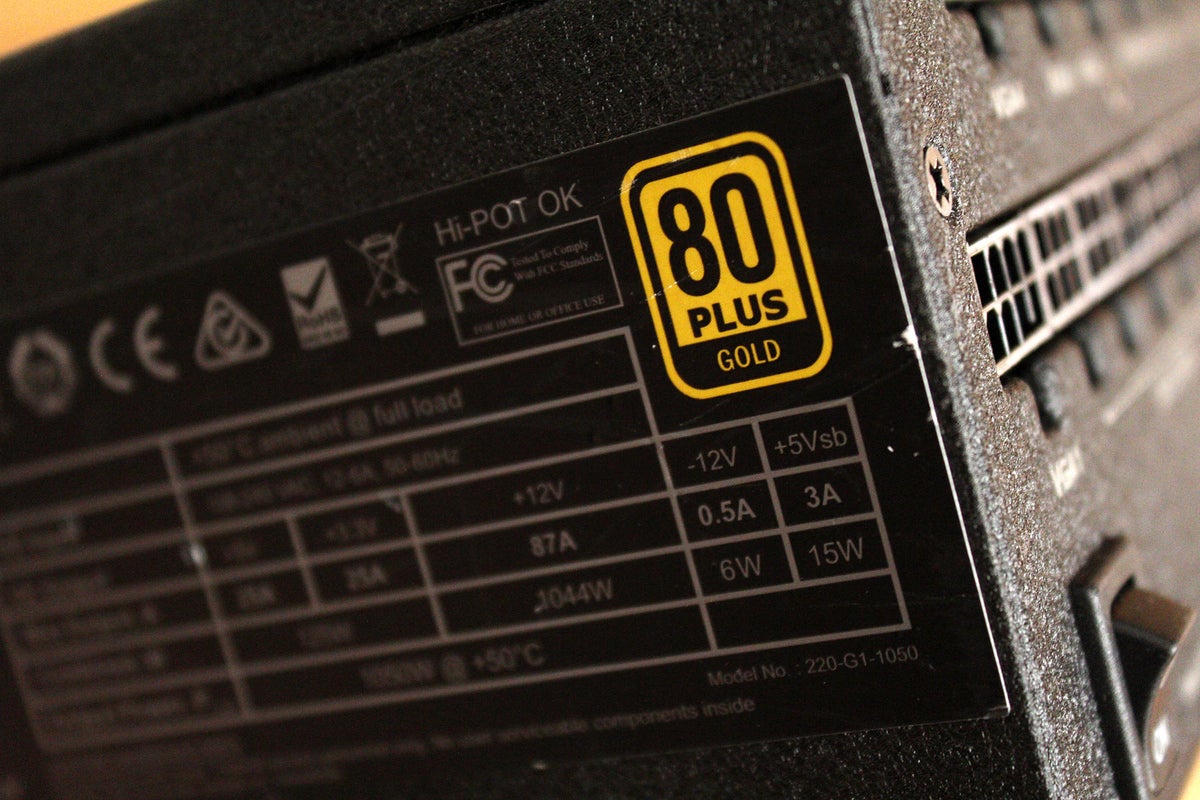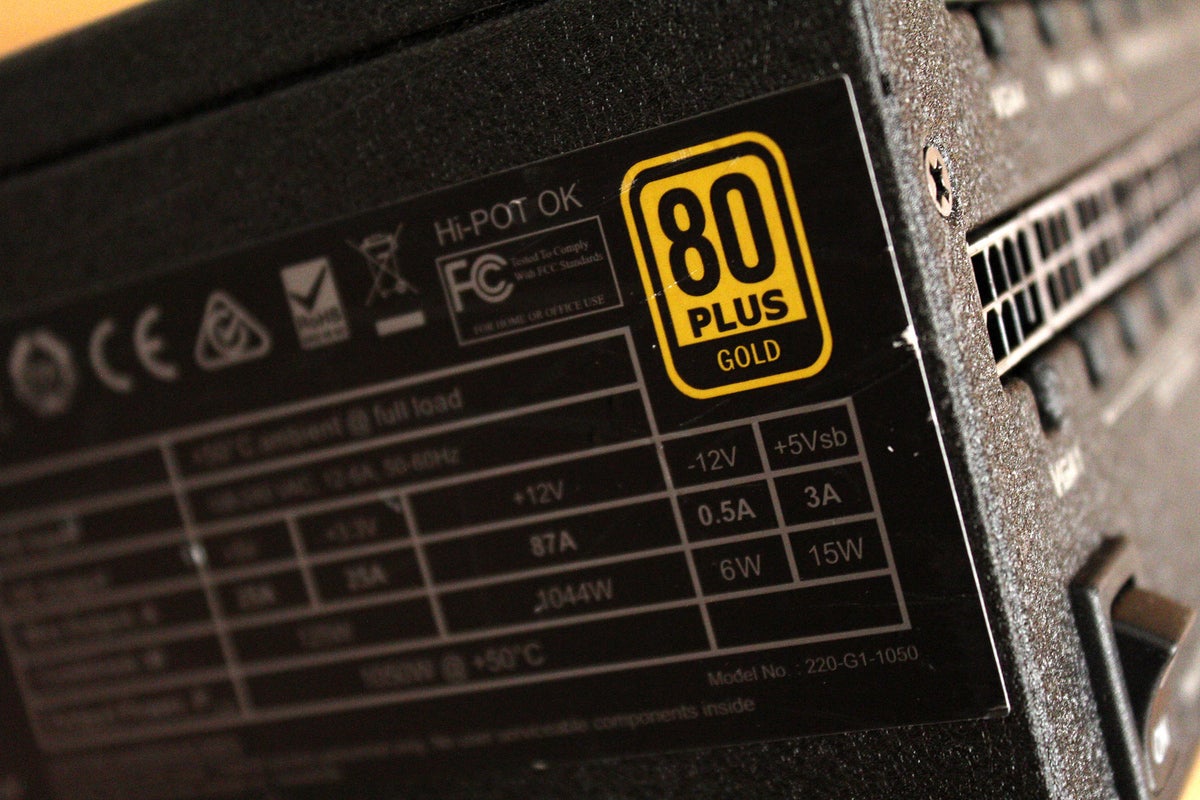The names of precious metals imply an overall level of quality, but they really only tell part of the story.
Alaina Yee / IDG
Today’s Best Tech Deals
Picked by PCWorld’s Editors
Top Deals On Great Products
Picked by Techconnect’s Editors
Show More
Listen to advice from some corners of the internet, and it can sound like not buying the most efficient power supply possible will cause your PC to blow up. That’s simply not true, and you can spend money needlessly going that route.
Efficiency ratings for power supplies certainly lend themselves to that misperception, because the differences between 80 Plus (also known as 80 Plus White), 80 Plus Bronze, 80 Plus Silver, 80 Plus Gold, 80 Plus Platinum, and 80 Plus Titanium power supplies aren’t exactly immediately clear. But dig into how the system works, and you’ll see that you may get by just fine with an 80 Plus White power supply—or perhaps need a Platinum-rated one over a Bronze-rated one.
Efficiency ratings explained
A power supply’s efficiency rating tells you how much energy makes the conversion from AC power (what it draws from the wall) to DC power (what your PC’s components run off of). The rest is lost as heat. Power supplies rated as 80 Plus will have a 80-percent power to 20-percent heat ratio at 20-percent, 50-percent, and 100-percent load. As you get into the precious metal designations, the efficiency rises, capping out at 94-percent under 50-percent load for a Titanium-rated model. The efficiencies for power supplies rated at 80 Plus Bronze and above vary based on the amount of load.
The more efficient a power supply is, the less power it uses and the less heat it generates—which means a lower electricity bill and a quieter PSU. The components tend to be better too, which means you should be able to use it for longer. Manufacturer warranties usually reflect this: A Bronze-rated power supply might get a 3- to 5-year warranty, while a Platinum-rated model will be backed for 10 years.
These days, the most power supplies from well-known, reliable manufacturers have an 80 Plus or above certification, but it is possible to find other PSUs that fall below that. Those cheap power supplies that get included as part of a bundle with ultra-cheap cases? Not 80 Plus-rated.
 CLEAResult.com
CLEAResult.comThe actual percentage of efficiency for the U.S. and other countries with electrical grids that run on similar voltage. (You can see the full chart on CLEAResult’s site.) The minimum efficiency to meet ATX specifications is 60-percent at 50-percent load—much lower than where the 80 Plus standard begins.
How to choose an efficiency rating for a power supply
Three main considerations help determine what efficiency rating will work best for your PC build:
- Local electricity rates
- Ambient temperatures
- Budget
Most average PC users who live in a temperate climate with low pricing for electricity will do fine with a standard 80 Plus or 80 Plus Bronze power supply. As you can see in the table above, the efficiencies don’t dramatically jump as you move to a higher rating.
What actually matters more is the quality of the specific model you’re considering. We recommend verifying how efficient a power supply actually is on the website of the group that issues 80 Plus certification, as well as considering the parts that go into it and who manufactures it—which isn’t always the same as who puts their company logo on it. (Our guide on how to choose a power supply can help walk you more fully through the process of vetting one before buying.) You can encounter situations where a Bronze-rated power supply can outperform a Gold-rated rival, for example.
 EVGA
EVGATypically as you go up in wattage, power supply efficiency ratings rise as well. But efficiency ratings don’t always tell the whole story about a specific model’s performance, so be sure to read reviews to get the full picture.
If you live someplace where electricity is more expensive, then the cost savings of a more efficient power supply can be worth the higher initial price. A higher-rated PSU can also make sense if you live somewhere that gets very hot for long periods, as ultra-warm ambient temperatures can reduce a power supply’s efficiency. Less heat from your power supply means less noise from its fan and less work on your part to keep your PC cool overall, too.
By the way, when calculating a power supply’s expected electricity cost, don’t forget that the wattage listed on a power supply is the maximum potential amount of DC power. You need the amount of AC power (what you draw at the wall) for an accurate estimate, which requires a little math. For example, an 80 Plus White 500W power supply at 50-percent load would work out to 250W DC power, or 312.5W AC power. You’ll use that latter number (312.5) when tabulating your electricity consumption.
In general, the higher you climb in wattage, so too does the efficiency rating. Your decisions will typically fall between just two to three options, which will make the selection process easier. Don’t feel obligated to spend more than you need—budget still matters. Buy a power supply with an efficiency that fits your situation, not the demands of other people who believe you must always maximize on specs.
Note: When you purchase something after clicking links in our articles, we may earn a small commission. Read our affiliate link policy for more details.


